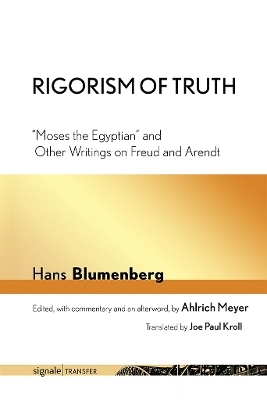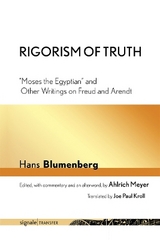Rigorism of Truth
"Moses the Egyptian" and Other Writings on Freud and Arendt
Seiten
2018
Cornell University Press (Verlag)
978-1-5017-1672-0 (ISBN)
Cornell University Press (Verlag)
978-1-5017-1672-0 (ISBN)
- Lieferbar (Termin unbekannt)
- Versandkostenfrei
- Auch auf Rechnung
- Artikel merken
In "Moses the Egyptian"—the centerpiece of Rigorism of Truth, the German philosopher Hans Blumenberg addresses two defining figures in the intellectual history of the twentieth century: Sigmund Freud and Hannah Arendt. Unpublished during his lifetime, this essay analyzes Freud’s Moses and Monotheism (1939) and Arendt’s Eichmann in Jerusalem...
In "Moses the Egyptian"—the centerpiece of Rigorism of Truth, the German philosopher Hans Blumenberg addresses two defining figures in the intellectual history of the twentieth century: Sigmund Freud and Hannah Arendt. Unpublished during his lifetime, this essay analyzes Freud’s Moses and Monotheism (1939) and Arendt’s Eichmann in Jerusalem (1963), and discovers in both a principled rigidity that turns into recklessness because it is blind to the politics of the unknown.
Offering striking insights into the importance of myth in politics and the extent to which truth can be tolerated in adversity, the essay also provides one of the few instances where Blumenberg reveals his thinking about Judaism and Zionism. Rigorism of Truth also includes commentaries by Ahlrich Meyer that give a fuller understanding of the philosopher’s engagement with Freud, Arendt, and the Eichmann trial, as well as situating these reflections in the broader context of Blumenberg’s life and thought.
In "Moses the Egyptian"—the centerpiece of Rigorism of Truth, the German philosopher Hans Blumenberg addresses two defining figures in the intellectual history of the twentieth century: Sigmund Freud and Hannah Arendt. Unpublished during his lifetime, this essay analyzes Freud’s Moses and Monotheism (1939) and Arendt’s Eichmann in Jerusalem (1963), and discovers in both a principled rigidity that turns into recklessness because it is blind to the politics of the unknown.
Offering striking insights into the importance of myth in politics and the extent to which truth can be tolerated in adversity, the essay also provides one of the few instances where Blumenberg reveals his thinking about Judaism and Zionism. Rigorism of Truth also includes commentaries by Ahlrich Meyer that give a fuller understanding of the philosopher’s engagement with Freud, Arendt, and the Eichmann trial, as well as situating these reflections in the broader context of Blumenberg’s life and thought.
Hans Blumenberg (1920–1996) was Professor of Philosophy, Emeritus, at the University of Münster and the author of books including Paradigms for a Metaphorology (also in Cornell's Signale series), The Legitimacy of the Modern Age, The Genesis of the Copernican World, and Work on Myth. Joe Paul Kroll is Editor at the Leibniz Institute of European History, Mainz, Germany. Ahlrich Meyer, a German political scientist and historian, is the author of many books in German.
| Erscheinungsdatum | 20.02.2018 |
|---|---|
| Reihe/Serie | signale |
| Übersetzer | Joe Paul Kroll |
| Zusatzinfo | 3 Halftones, black and white; 5 Line drawings, black and white |
| Verlagsort | Ithaca |
| Sprache | englisch |
| Maße | 152 x 229 mm |
| Gewicht | 454 g |
| Themenwelt | Geisteswissenschaften ► Philosophie ► Erkenntnistheorie / Wissenschaftstheorie |
| ISBN-10 | 1-5017-1672-7 / 1501716727 |
| ISBN-13 | 978-1-5017-1672-0 / 9781501716720 |
| Zustand | Neuware |
| Informationen gemäß Produktsicherheitsverordnung (GPSR) | |
| Haben Sie eine Frage zum Produkt? |
Mehr entdecken
aus dem Bereich
aus dem Bereich
die Grundlegung der modernen Philosophie
Buch | Softcover (2023)
C.H.Beck (Verlag)
CHF 25,20
Buch | Softcover (2023)
Reclam, Philipp (Verlag)
CHF 9,80



![Was heißt Denken?. Vorlesung Wintersemester 1951/52. [Was bedeutet das alles?] - Martin Heidegger](/media/113619842)
